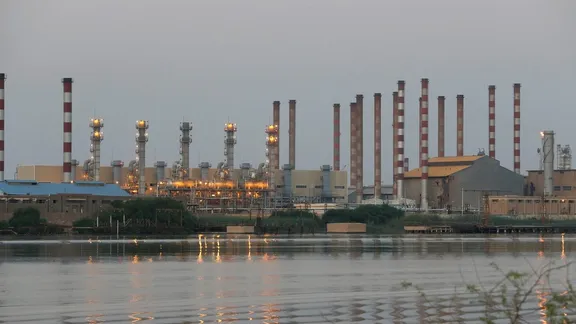Iran's energy exports to Iraq sag amid US sanctions

Iran’s natural gas exports to neighboring Iraq have fallen sharply over the past five months after US sanctions which long exempted the trade take hold.

Iran’s natural gas exports to neighboring Iraq have fallen sharply over the past five months after US sanctions which long exempted the trade take hold.
Between April and August 2025, exports dropped by 40%, continuing a downward trend that began in 2024, according to financial intelligence platform Zawya.
“Iran’s exports to Iraq in the first five months of this year decreased by 18% compared to the same period last year, with a significant portion of the decline due to gas exports,” Abdulamir Rabihavi, Director General of the West Asia Office at Iran’s Trade Promotion Organization, said on September 15.
“In the first five months of last year, we exported around $1.6 billion worth of gas to Iraq, but this has fallen to $950 million this year," he was quoted as saying by Iran's Etemad newspaper.
Iraq’s imports have been constrained by stepped-up United States sanctions. In March 2025, the Trump administration revoked a waiver that allowed payments for Iranian electricity imports as a long-standing carve out to broad US sanctions on Tehran.
Baghdad seeks to diversify supplies by launching a new gas import line from Turkmenistan. However, because the pipeline runs through Iran, it remains subject to US sanctions, and Washington has refused to grant Iraq a waiver.
“The entry of new competitors and possible shifts in Iraq’s market require constant monitoring and preparedness by economic actors,” Etemad newspaper quoted Yahya Al-Ishaq, President of the Iran-Iraq Chamber of Commerce, as saying.
Hamid Hosseini, a member of the Iran Chamber of Commerce, noted: “One of Iraq’s main policies in recent years has been to support domestic production. The government regularly raises import tariffs, sometimes up to 36%.”
Despite holding vast natural gas reserves, Iraq lacks the infrastructure to fully utilize them and continues to depend on imports.
The country does not have enough refineries to process associated gas from its oil fields and still flares a large portion of it.
The US maximum pressure campaign on Iran, reinstated by President Trump in February 2025 via a National Security Presidential Memorandum, aims to deny Tehran nuclear weapon paths and counter its regional influence through sweeping sanctions on its energy sector, including oil exports targeted at zero.
The policy has blocked waivers for third-country energy deals involving Iran, directly curtailing Tehran's gas and electricity flows to Iraq and exacerbating domestic shortages.